New Connections appear every Wednesday. Sign up for a reminder.
Publications production manager Peter Antony revels in the drama running throughout the history of the Tudors.
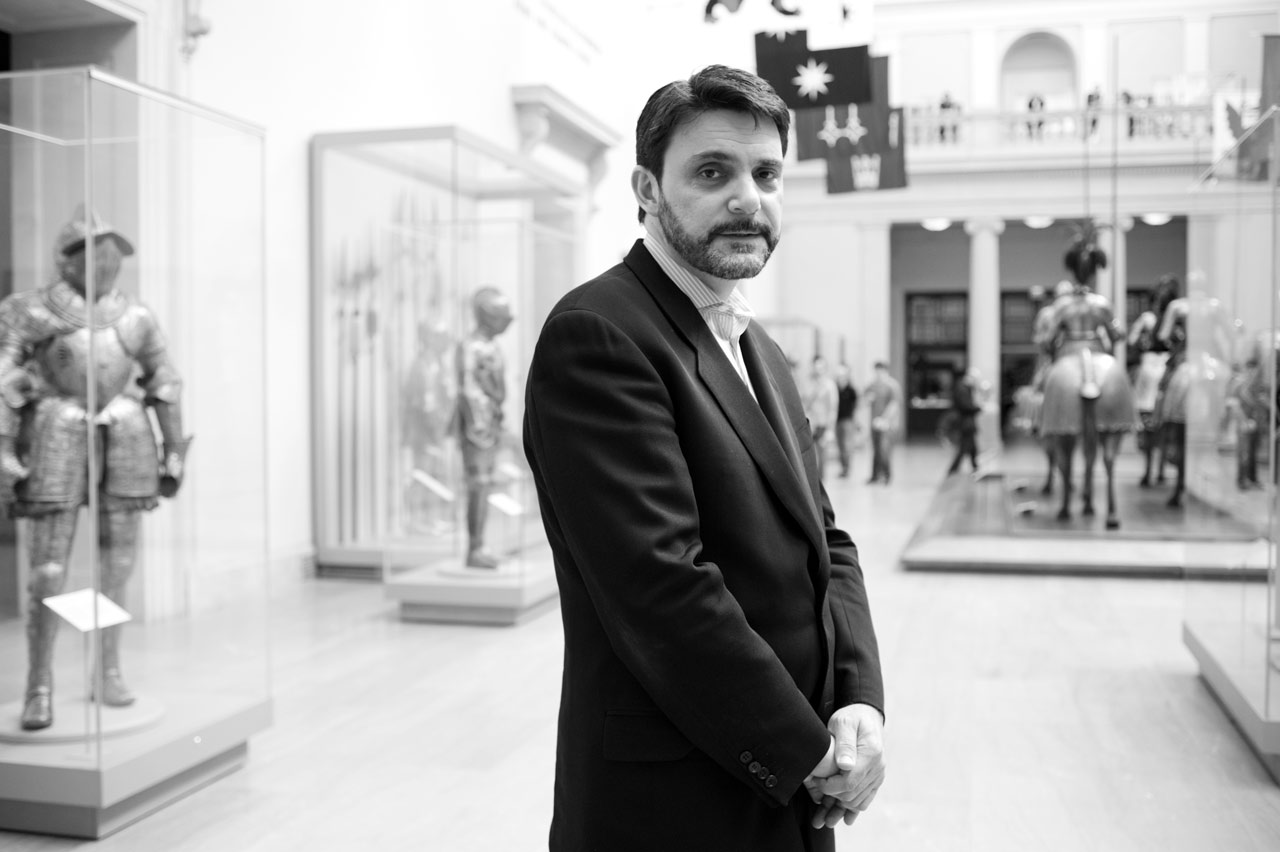 1280852
1280852 8181024
8181024 8141024
8141024 9581024
9581024 10271024
10271024 10411024
10411024 10801024
10801024 10581024
10581024 5831024
5831024 10331024
10331024 10201024
10201024 6081024
6081024 8611024
8611024 1280936
1280936 7391024
7391024 8001024
8001024 8971024
8971024 10081024
10081024 8941024
8941024 7411024
7411024 8411024
8411024 7951024
7951024 1280852
1280852
My name is Peter Antony, and I work in the editorial department at the Metropolitan Museum. My topic today is the Tudors.
From a very early age, I became keenly interested in British monarchs.
These characters in my mind are larger than life, who
made all sorts of political and religious changes that we're still living with the ramifications of.
But that's not it entirely, it's often as simple as these people's personalities.
It's risky to judge a medieval or early Renaissance family by modern psychotherapeutic standards, but they seem to me to have been extremely dysfunctional.
Henry VIII clearly had issues. Six wives I think by any standard is excessive, and you know, to go out of your way to kill two of them is a bit much. And you can
see the effects of how he lived, he appears to be obese, exhausted, irritated and maybe a little gouty. And
we get the sense of the physical presence of Henry by looking at his field armor. Some of these objects are
at least comparatively speaking, modest, but the stories behind them add tremendous value. Henry's son
Edward VI, was crowned as a boy and died as a boy, a very poignant story.
Mary I, Bloody Mary, her mother set aside her princess title, she was called a bastard by her own father, and she came to the throne and she—it was pay back time. She wanted revenge. It's that kind of color that continues to draw me to the period.
Philip II of Spain was her husband, but not a very affectionate one. And of course it's this figure who sent the Spanish Armada against England so calamitously. He went on to propose to Mary's sister
Elizabeth I. Elizabeth did decline that marriage proposal as she declined all of the great many marriage proposals that were offered to her over decades of her reign.
Historians really do differ on whether Elizabeth's purported virginity was a fact, or whether it was a posture she assumed. You know, people differ. Robert Devereux was
her last great favorite, featured all the time in films and television and popular novels. We don't know whether their relationship was physical. But Elizabeth executed him, he was part of a rebellion, he was implicated in a rebellion, and she had him executed. And it isn't
always clear to me, as I think about these figures, the degree to which there was affection between and among them, but you know I'm not really feeling the love. What I do see is that they were all deeply preoccupied with dynastic concerns. You know, depending on how you came down in religious and nationalistic terms, that was where you sided. Tremendous drama. Of all of the figures
This fellow was some sort of figure in the court Henry VIII. He's wearing the livery of the court and he's looking out of this picture in a way that helps me to imagine what he would have beheld. The extraordinary spectacle, perhaps the marital intrigues, the crushing, calamitous political failures that resulted in people being executed.
The pageantry, you know, the music of the period,
the dance. It's the age of Shakespeare and Holbein was brought from Germany
to paint portraits. The period's fascinating to me not only because of the political and religious tumult, and these characters are fascinating to me
not only because of the drama of their personal lives, the period's also interesting because it was a period during which culture
flourished.
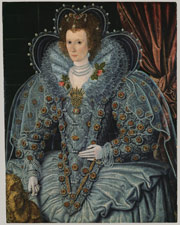 |
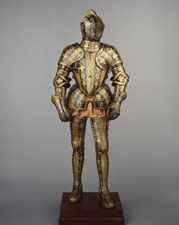 |
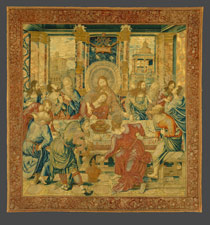 |
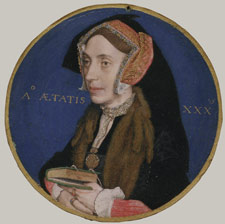 |
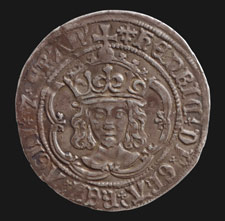 |
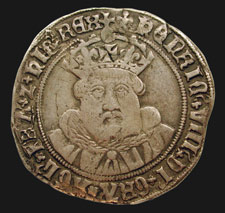 |
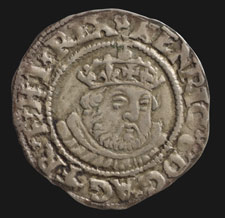 |
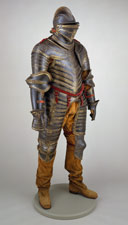 |
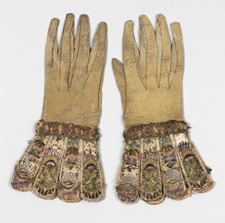 |
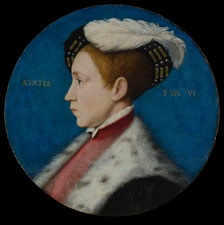 |
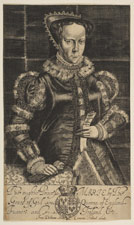 |
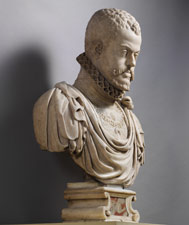 |
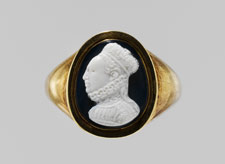 |
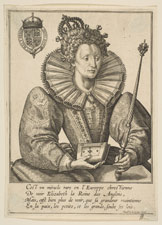 |
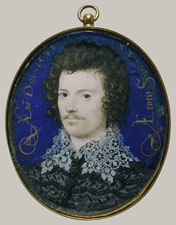 |
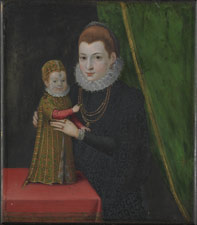 |
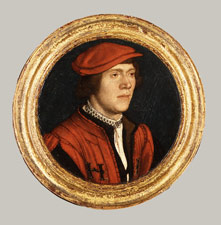 |
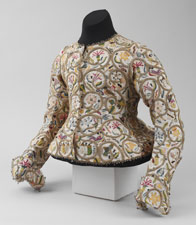 |
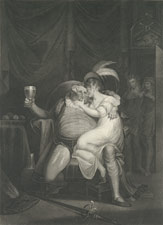 |
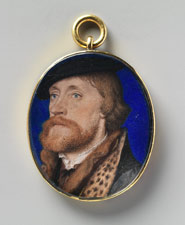 |
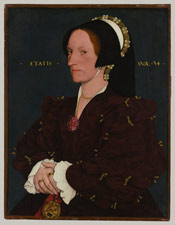 |
Works of art in order of appearanceLast Updated: June 22, 2015. Not all works of art in the Museum's collection may be on view on a particular day. For the most accurate location information, please check this page on the day of your visit. |
||
 |
Portrait of a Noblewoman late 16th century British Painter Oil on wood Gift of J. Pierpont Morgan, 1911 (11.149.1) More information: The Collection Online Not on view
|
 European PaintingsSecond Floor
European PaintingsSecond Floor |
 |
Armor of George Clifford, Third Earl of Cumberland ca. 1580–85 Made in the Royal Workshops English (Greenwich) Steel, etched, blued, and gilded Munsey Fund, 1932 (32.130.6) More information: The Collection Online Not on view
|
 Arms and ArmorFirst Floor
Arms and ArmorFirst Floor |
 |
The Last Supper, from a set of four tapestries of the Passion, known as the Alba Passion ca. 1520–30 Bernaert van Orley (Flemish); Probably designed by Pieter de Pannemaker (Flemish) Wool, silk, and silver-gilt thread Robert Lehman Collection, 1975 (1975.1.1915) More information: The Collection Online Not on view
|
 The Robert Lehman CollectionFirst Floor
The Robert Lehman CollectionFirst Floor |
 |
Margaret More (1505–1544), Wife of William Roper 1535–36 Hans Holbein the Younger (German) Vellum laid on playing card Rogers Fund, 1950 (50.69.2) More information: The Collection Online Not on view
|
 European PaintingsSecond Floor
European PaintingsSecond Floor |
 |
Groat of Henry VII (1485–1509) early 16th century English Silver Gift of Assunta Sommella Peluso, Ada Peluso, and Romano I. Peluso, in memory of Ignazio Peluso, 2001 (2001.432.8) More information: The Collection Online Not on view
|
 European Sculpture and Decorative ArtsFirst Floor
European Sculpture and Decorative ArtsFirst Floor |
 |
Testoon of Henry VIII (third coinage) 1509–47 English (London) Silver Gift of Assunta Sommella Peluso, Ignazio Peluso, Ada Peluso and Romano I. Peluso, 2007 (2007.160.6) More information: The Collection Online Not on view
|
 European Sculpture and Decorative ArtsFirst Floor
European Sculpture and Decorative ArtsFirst Floor |
 |
Half Groat of Henry VIII (1509-1547) 1544–47 English Silver Gift of Assunta Sommella Peluso, Ada Peluso, and Romano I. Peluso, in memory of Ignazio Peluso, 2001 (2001.432.9) More information: The Collection Online Not on view
|
 European Sculpture and Decorative ArtsFirst Floor
European Sculpture and Decorative ArtsFirst Floor |
 |
Armor of King Henry VIII, King of England ca. 1544 Italian Steel, blackened, etched, and gilt; textile and leather Harris Brisbane Dick Fund, 1932 (32.130.7a–l) More information: The Collection Online Not on view
|
 Arms and ArmorFirst Floor
Arms and ArmorFirst Floor |
 |
Pair of gloves ca. 1600 English Leather; satin worked with silk and metal thread, seed pearls; satin, couching, and darning stitches; metal bobbin lace; paper Gift of Mrs. Edward S. Harkness, 1928 (28.220.7,.8) More information: The Collection Online Not on view
|
 European Sculpture and Decorative ArtsFirst Floor
European Sculpture and Decorative ArtsFirst Floor |
 |
Edward VI (1537–1553), When Duke of Cornwall Workshop of Hans Holbein the Younger (English, after 1543) Oil on wood The Jules Bache Collection, 1949 (49.7.31) More information: The Collection Online Not on view
|
 European PaintingsSecond Floor
European PaintingsSecond Floor |
 |
Mary I, Queen of England 1600–27 Francis Delaram (British) Engraving; first state The Elisha Whittelsey Collection, The Elisha Whittelsey Fund, 1956 (56.613) More information: The Collection Online Not on view
|
 Drawings and PrintsSecond Floor
Drawings and PrintsSecond Floor |
 |
Philip II of Spain 16th century Pompeo Leoni (Italian) Marble Bequest of Annie C. Kane, 1926 (26.260.91) More information: The Collection Online Not on view
|
 European Sculpture and Decorative ArtsFirst Floor
European Sculpture and Decorative ArtsFirst Floor |
 |
Elizabeth I of England (1533–1603) ca. 1570–1600 Probably Italian Onyx and gold The Milton Weil Collection, 1938 (38.150.32) More information: The Collection Online Not on view
|
 European Sculpture and Decorative ArtsFirst Floor
European Sculpture and Decorative ArtsFirst Floor |
 |
Queen Elizabeth I of England late 16th–mid 17th century Anonymous (French) Engraving Harris Brisbane Dick Fund, 1917 (17.3.756–1618) More information: The Collection Online Not on view
|
 Drawings and PrintsSecond Floor
Drawings and PrintsSecond Floor |
 |
Portrait of a Young Man, Probably Robert Devereux (1566–1601), Second Earl of Essex 1588 Nicholas Hilliard (British) Vellum laid on card Fletcher Fund, 1935 (35.89.4) More information: The Collection Online Not on view
|
 European PaintingsSecond Floor
European PaintingsSecond Floor |
 |
Mary, Queen of Scots, with Her Son, James 19th century English Painter Oil on slate Gift of J. Pierpont Morgan, 1917 (17.190.2) More information: The Collection Online Not on view
|
 European PaintingsSecond Floor
European PaintingsSecond Floor |
 |
Portrait of a Man in a Red Cap ca. 1534 Hans Holbein the Younger (German) Oil on wood Bequest of Mary Stillman Harkness, 1950 (50.145.24) More information: The Collection Online Not on view
|
 European PaintingsSecond Floor
European PaintingsSecond Floor |
 |
Woman's jacket ca. 1616 English Linen worked with silk and metal thread, spangles; detached buttonhole variations, wrapped ladder stitch, straight, knot, chain, and satin stitches, metal bobbin lace Rogers Fund, 1925 (23.170.1) More information: The Collection Online Not on view
|
 The Costume InstituteFirst Floor
The Costume InstituteFirst Floor |
 |
Doll Tearsheet, Falstaff, Henry and Poins (Shakespeare's Second Part of King Henry the Fourth, Act II, Scene IV) 1795 William Satchwell Leney (American); Henry Fuseli (Johan Heinrich Füssli) (Swiss) Published by John & Josiah Boydell, London Stipple engraving Gertrude and Thomas Jefferson Mumford Collection, Gift of Dorothy Quick Mayer, 1942 (42.119.534) More information: The Collection Online Not on view
|
 Drawings and PrintsSecond Floor
Drawings and PrintsSecond Floor |
 |
Thomas Wriothesley (1505–1550), First Earl of Southampton ca. 1535 Hans Holbein the Younger (German) Vellum laid on card Rogers Fund, 1925 (25.205) More information: The Collection Online Not on view
|
 European PaintingsSecond Floor
European PaintingsSecond Floor |
 |
Lady Lee (Margaret Wyatt, born about 1509) possibly ca. 1540 Copy after Hans Holbein the Younger (English, 16th century) Oil on wood Bequest of Benjamin Altman, 1913 (14.40.637) More information: The Collection Online Not on view
|
 European PaintingsSecond Floor
European PaintingsSecond Floor |
© 2011 The Metropolitan Museum of Art |
||

